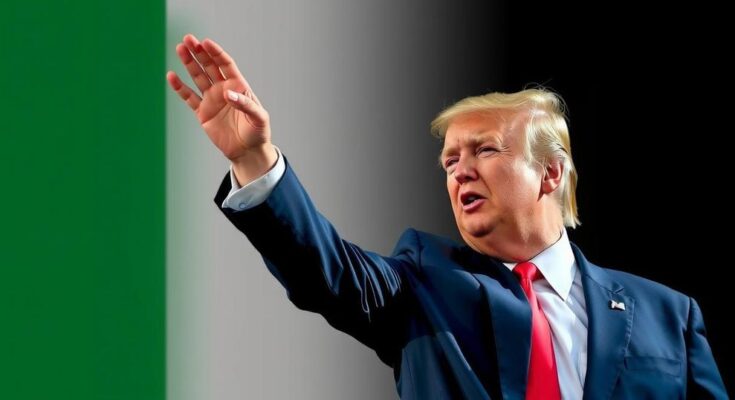Donald Trump’s victory as president raises significant implications for Nigeria, impacting potential immigration policies and trade relations. His ‘America First’ agenda suggests a more self-reliant approach for nations, which may challenge Nigeria’s development efforts. The reaction from Nigerian leadership indicates both hope for strengthened ties and concerns about the realities of Trump’s policy implications.
Donald Trump’s historic second term victory against Kamala Harris raises several considerations for Nigeria, the most populous nation in Africa. Trump has emphasized a non-interventionist foreign policy through his “America First” agenda, suggesting that nations, including Nigeria, may need to take greater responsibility for their own security and development. Analysts express concerns that under Trump’s administration, Nigeria could face stringent immigration policies aimed at undocumented immigrants, alongside potential economic ramifications affecting trade with the United States. President Bola Tinubu has congratulated Trump and expressed a desire to strengthen ties between Nigeria and the U.S., but the robust policies championed by Trump during his campaign, particularly in immigration and trade, may reshape those relations in challenging ways. Twitter conversations indicate that African leaders, while optimistic about diplomatic engagements with Trump, must navigate an uncertain political landscape marked by Trump’s historical under-engagement with African issues. In terms of immigration, Trump’s promise to enforce strict measures could affect many Nigerians and others from Africa who have migrated to the U.S. without legal status, leading experts to caution that these individuals should be wary of the possible ramifications of such policies. Economically, analysts point out that Nigeria and other developing nations might not benefit from Trump’s presidency due to his focus on domestic industry and a lack of commitment to foreign aid or cooperation. The anticipated tariffs on imports could further strain trade relations, potentially worsening economic conditions in Nigeria as well. Despite missing opportunities to foster deep connections in Africa during his first term, there is a suggestion that Trump’s renewed presidency might compel him to engage on critical issues like governance, health, and security. However, analysts remain skeptical about substantial gains for Nigeria under a government perceived as preoccupied with prioritizing America above all else. As the global community watches closely, the prospects for Nigeria under Trump’s leadership remain a subject of significant interest and concern, balancing hopes for economic cooperation against the backdrop of a possible retreat in support from the U.S. government. In summary, Trump’s victory signals an era of heightened self-reliance for Nigeria, challenging the nation to address its internal issues while navigating a complex international relationship with the United States.
The recent victory of Donald Trump in the U.S. presidential election poses significant implications for Nigeria, Africa’s most populous nation. Trump has articulated a foreign policy focused on ‘America First,’ proposing that other countries should independently handle their security and development challenges. This position raises questions regarding U.S. engagement with Africa and how it will affect diplomatic relations and economic collaboration with Nigeria, particularly in the realms of immigration and trade.
In conclusion, Donald Trump’s re-election may usher in a period defined by a call for self-sufficiency among nations like Nigeria. His administration is expected to impose strict immigration policies, impacting many Nigerians in the U.S., while trade relations could become strained due to proposed tariffs. Additionally, Nigerian leadership will need to navigate a potentially indifferent U.S. policy stance towards Africa, balancing diplomatic hope with the reality of reduced aid and engagement. The relationship between Nigeria and the U.S. during Trump’s term will be closely scrutinized, as it may provide critical insights into the evolving dynamics of global politics.
Original Source: www.bbc.com




